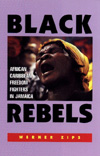 This book chronicles the struggles of African-Americans who escaped from slavery and developed autonomous, “maroon” societies beyond the fringes of the colonial system, demonstrating the vulnerability of colonial rule and the vitality of black resistance in the Caribbean. Illustated with color and black and white plates.
This book chronicles the struggles of African-Americans who escaped from slavery and developed autonomous, “maroon” societies beyond the fringes of the colonial system, demonstrating the vulnerability of colonial rule and the vitality of black resistance in the Caribbean. Illustated with color and black and white plates.
“This book fulfills the author’s promise to write a history of resistance instead of a history of domination. … African-Americans who escaped from slavery and developed autonomous societies beyond the fringes of the colonial system demonstrated the vulnerability of colonial rule and the vitality of black resistance.
“The context of marronage is carefully established: the plantation system as an economic and ideological machine fueled by the abuse of black working power and the forms of black resistance against the terror of exploitation. The concept of resistance stresses the importance of new forms of syncretic ethnic identities after the destruction of traditional tribal structures. Zips probes the structure of unequal confrontation between the British and the Maroons, which made highly specialized skills necessary. The central part of the book deals with the current history and organization of the surviving Maroon villages in Jamaica.
“It is to be hoped that this stimulating and well-researched study will be translated into English and there find the resonance it deserves within the discourse of post-colonial studies.”— New West Indian Guide
“Zips skillfully combines the critical analysis of historical documents, oral history, and ethnography based on his fieldwork in the 1980s. This book is clearly written and has a good bibliography.”— Choice
